new posts in all blogs
Viewing: Blog Posts Tagged with: wfmad, Most Recent at Top [Help]
Results 1 - 25 of 74
How to use this Page
You are viewing the most recent posts tagged with the words: wfmad in the JacketFlap blog reader. What is a tag? Think of a tag as a keyword or category label. Tags can both help you find posts on JacketFlap.com as well as provide an easy way for you to "remember" and classify posts for later recall. Try adding a tag yourself by clicking "Add a tag" below a post's header. Scroll down through the list of Recent Posts in the left column and click on a post title that sounds interesting. You can view all posts from a specific blog by clicking the Blog name in the right column, or you can click a 'More Posts from this Blog' link in any individual post.

By: Laurie Halse Anderson,
on 8/31/2011
Blog:
Mad Woman in the Forest
(
Login to Add to MyJacketFlap)
JacketFlap tags:
wfmad,
wriing,
Add a tag
--
It’s a celebration!!!!!
You made it! Thirty-one days in a row of writing at least fifteen minutes a day!
::dances with abandon, horrifying everyone in the room and embarrassing the dogs::
Wait.
Why aren’t you dancing? Why are you looking at me like that? I know that I dance like Dorkasaurus Rex, but I have fun while I’m doing it, so it’s all good. ::resumes ghastly dance moves::
::stops dancing::
You mean you
didn’t write for fifteen minutes every day during the month of August?
::Kool and The Gang stop playing and stare. A waiter drops of tray full of champagne glasses::
So?
I’m not going to scold you, silly. (You’re already doing a good job of that.) Besides, scolding has never turned anyone’s mood from anxious to creative. Listen up. You tried. That’s all any of us can do. I bet that if you’ve been (more or less) following these blog posts this month, that you’ve written more than usual, and you’ve thought about writing more than usual. And I bet that there are few of you (Carrie?) who managed to write every single day, or something close to that goal.
WFMAD is the time for us to come together and commiserate about the missteps we make with time management. When the self-flaggellation ends, I hope we can get down to the business at hand; restoring creativity to our lives, in whatever form feels right and good.
I’m not going to give you advice today. Or a quote. Or a prompt.
OK, I lied. I’ll give a little advice.
Life is short, my friends. Way too short. There’s not nearly enough time to love as much as we want and laugh and watch the stars and hold babies and eat good food and hang out with friends and express the creativity that God put in our hearts. So get to it.
If you want to write, make the time to do it. It’s as easy and as hard as that. When you’re done writing, I hope you’ll come back and dance with me. And with these two guys…
--
First things, first. As I post this, Muslims on the other side of the world are waking up and celebrating the end of Ramadan.
Eid Sa‘eed!
If you are celebrating the Eid, I hope you have a blessed day. I also hope (if you’ve been following this blog for the past month), you’re able to take fifteen minutes to write. That goes for all of you who are not celebrating the Eid, too!

Indonesian Muslim children in a parade celebrating Eid al-Fitr in Jakarta.
Photo credit Dita Alangkara/AP
OK, time to change the topic and think about writing.
I live in a rural, poor area that has been hit incredibly hard by the last couple of years. I find myself thinking about poverty, and its causes and effects, a lot. One of the frustrating things about the state of literature (at least in the United States) is that it is largely a product of the middle or upper class. Working people; farmers, carpenters, factory workers – not to mention the chronically unemployed generally have bigger issues to deal with than “My Muse is being a bitch and won’t talk to me.”
Maybe this doesn’t frustrate you. But it frustrates the hell out of me. Hence, today’s prompt.
Ready… If you need some hard numbers to help you think about the class structure in America,
check this out. Or read about what
America’s economic crisis looks like from England.
Set… “I would hurl words into this darkness and wait for an echo, and if an echo sounded, no matter how faintly, I would send other words to tell, to march, to fight, to create a sense of hunger for life that gnaws in us all.”
Richard Wright
Today’s prompt: Either write about your character coming in contact (and/or conflict) with someone who is from a different economic class than he is, or write about your own class experience. Can you remember the first time you realized that some people have more money than others? Class differences can spark strong emotions, but we are often taught to suppress these feelings and to guard our behavior in these situations. The strong emotional currents this creates provides the writer with a wealth (ahem) of material.
OR
Write about what you
don’t know about a social or economic class, or a lifestyle that is completely different than yours.
Scribble… Scribble… Scribble…
--
I’ve heard from a number of you recently about the struggle to maintain your confidence during the writing process. Many (all?) of you are beset by doubts about your talent, your current project, the competition, the marketplace, your future, and pretty much everything related to being a writer.
So am I.
Frankly, it’s amazing any of us manage to get out of bed in the morning.
I think that being plagued by the Demons of Doubt is the hardest part of being a writer. (Please note – if you are writing, you are a writer. It doesn’t matter if you are published or not.)
So what are we supposed to do?

Ready… We’re just about at the end of the 2011 WFMAD Challenge. If you’re looking for a writing buddy to help you keep up your writing momentum until next year, post your email address and name in the Comments section. Get yourself a new, writing-only Hotmail or other address if you don’t want to publicize your real one.
Set… “It is worth mentioning, for future reference, that the creative power which bubbles so pleasantly in beginning a new book quiets down after a time, and one goes on more steadily. Doubts creep in. Then one becomes resigned. Determination not to give in, and the sense of an impending shape keep one at it more than anything.”
Virginia Woolf
Today’s prompt: The Demons of Doubt will always sit on your shoulders. Sorry. It’s a law of writing physics.
You cannot banish them, but you can defang them.
Think about the best day writing you ever had; that perfect storm of creation during which you lost track of where you were and the passage of time – the best day when you lost yourself in the world of your novel.
Write about that day in beautiful, loving detail.
That is your shield. You will wave this in the face of the demons when they rise up and try to infect you with their bile. To hell with them!
Stop thinking about the marketplace. It doesn’t matter how old or young you are. It doesn’t matter if you have an MFA or not. It certainly does not matter if you think what you are writing is any good yet. (You are a WRITER, for the love of Pete! That means you’ll be REVISING. A LOT!!! Stop wasting energy judging your work and then beating the crap out of yourself because it sucks. Instead, use that energy to lift up the shield you just wrote. Fasten onto the memory of your best writing day. Then summon another day like that and get to work.
Scribble… Scribble… Scribble…
I think the most striking statistic about Hurricane Irene so far is CNN’s statement that the storm will affect 1 in 6 Americans. (I’m still trying to wrap my head around this.) We are far away from the danger; might get some wind and a little rain. We’re used to losing power frequently, so that’s not a problem. I sure hope those of you who are in Irene’s path stay safe, snug, and dry.
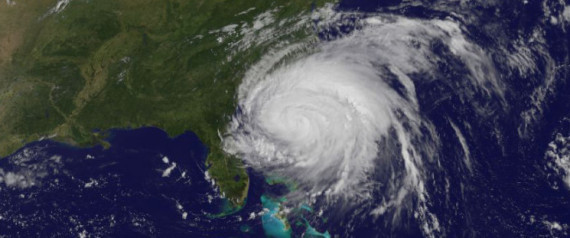
image credit Associated Press
In case your power is about to go out, let’s get busy right away with tonight’s Irene-inspired prompt.
Ready… Make sure that you pack a notebook (the kind made out of paper) and sharpened pencils in your go bag. Natural disasters provide all kinds of inspiration and you need your tools! (It’s easier to write in the rain with pencils than pens.)
Set… “To describe my mother would be to write about a hurricane in its perfect power.”
Maya Angelou
Today’s prompt: Your character has five minutes to throw his most important possessions into a backpack, because the hurricane has changed course and he and his family must flee. What goes in the bag? Why? And what is hidden in that small wooden box that he pulls down from the top shelf of his closet when no one is looking? Be as detailed as possible. This is a chance to show character by the decisions he makes.
Scribble… Scribble… Scribble…
(PSSSSST! BE SURE TO SCROLL TO THE BOTTOM OF TODAY”S POST! I HAVE TO ASK YOU SOMETHING!)

One of the differences (for me) between an early and a late draft is that as I revise, I trim or cut the opening chapters. I have a bad habit of frontloading too much information in early drafts. I see this when I do manuscript critiques, too. The author goes on a long-winded explanation of the culture of the world where the story is set, or they give every detail about the night the main character’s grandparents met, etc. These chapters have a great deal of “telling,” usually in the narrator’s omniscient voice, and not much in the way of “showing,” i.e. action or dialog.
If you are feeling a little guilty after reading the paragraph above, knock it off. This doesn’t mean you’re a bad writer. It means you’re still arm-wrestling an early draft.
But at some point, you need to take a deep breath, cut out all the fluff, and dive in to your story.
We shove all that background stuff into the front of the book where it doesn’t belong, because WE, that is, the author, are still figuring out the world of the story. The trick is once you’ve figured out all the background and the situations that led up to your opening dramatic scene, to cut out most or all of it. (The Latin for this is
in media res.) You’ll find ways to subtly weave in the information as the story unfolds. If you absolutely, positively cannot bring yourself to cut out the four pages of chapter one in which you explain why all the characters have one foot, and the etiquette of how a left-foot person asks a right-foot person to dance, and the overthrow of the government that was the direct result of the covert importation of the first sneakers ever seen in this distant land, then I have news for you.
You might want to find a different opening scene, one that is so compelling, you don’t drown your reader in backstory.
Ready… Clear your throat. For real. You sound like you’re coming down with something. Do you want a lemon drop?
Set… “Finally, I try to work slow. I plod, double-check, and triple-check and then check a couple more times. If I go slow enough, I can hopefully craft something that the reader will fly through in a straight rush. That’s the goal, anyway.”
Joe Hill
Today’s prompt: Write “Once upon a time,” and then complete the sentence. BUT! Make it an action-packed sentence. No background. No explanation. All showing, no telling. Make it the kind of sentence that will put your reader on the edge of his seat and beg you for the rest of the story. See if you can write at least fifteen of these sentences in the next fifteen minutes.
Scribble… Scribble… Scribble…
WAIT!! DON’T START WRITING YET! I HAVE A QUESTION!
Thank you.
The 4th Annual WFMAD Challenge is almost over. What would you like me to discuss in the days we have left? Any burning questions? Pet peeves? Ponderous problems? Tell me all about them and I’ll see what I can do to help.
OK. Now go do that scribble thing.
--
No earthquakes up here on the tundra today, so I’ll write yesterday’s original blog idea.
The idea came from my right knee. The right knee that started acting up at mile 13 during yesterday’s run, and forced me to stop many, many times to stretch. (Because it’s not really my knee that is the issue. My right
ITB has a tendency to tighten up, which pulls the knee a bit out of alignment.)
Yesterday’s run was supposed to be my first attempt at 20 miles as I continue with my training for
my first marathon this fall. I was nervous. My husband couldn’t come with me. I got started later than I wanted. But mostly I was nervous because what kind of idiot thinks they can run 20 miles? Or 26.2? That is insane.

The knee pain I was fighting seemed the best confirmation of my worst fears; that I’m not really a runner, that I’ll never be a runner, that I was born without the talent or the knees to run serious distances, that I’ve been deluding myself all year, that people are laughing about me behind my back, that I’m wasting my time, energy, and money, that I should be sensible and stick to 5Ks.
Sound familiar?
When you are pain, the whispers of doubt start to shout. It happens to everyone who is trying to express themselves creatively. The discomfort and confusion of trying to figure out a first draft leads you to doubt yourself, then get angry and criticize yourself, then come up with a bogus reason to procrastinate.
I did not quit yesterday. I slowed down, stretched a lot, walked a bit, and kept going. By mile 18, I started singing. Because I was going to make it. Not fast, not pretty, but who cares? I was running farther than I had ever run before. The sun was shining, birds singing, and I was joyous. I ran 21 miles yesterday. I did not let the fear and pain conquer me. They ran alongside me for a while, but I found the courage to wave good-bye to them and go off on my own path.
Ready… Take a minute to dream your secret dream of artistic or athletic triumph.
Set… “We gain strength, and courage, and confidence by each experience in which we really stop to look fear in the face… we must do that which we think we cannot.”
Eleanor Roosevelt
Today’s prompt: Write about a moment when you or your main character had to face a fear.
Scribble… Scribble… Scribble…
The pain in my knee weakened my resolve.
--
I had a great run today. On that great run, I thought of the PERFECT WFMAD blog post. I shuffled home, ate, showered, and headed out to run a few errands before I sat down to write. Somewhere in the middle of the errands, there was an earthquake. No, I did not feel it, though several people in my area said they did. (For the record, my kid in Brooklyn, and my kid outside of Philly both felt it rather dramatically.)
As I write this, damage and injury caused by the earthquake seem to be minimal. Since that’s the case, I’m using it.
(I’ll write the blog post I thought up while running tomorrow, as long as there is not another earthquake.)

image from the 1906 San Francisco earthquake
Ready… Make sure you have a clear path to the doorway, in case another earthquake hits and you need to flee. You can finish your fifteen minutes as soon as you are safely settled outside.
Set… “I by no means rank poetry high in the scale of intelligence – this may look like affectation but it is my real opinion. It is the lava of the imagination whose eruption prevents an earthquake.”
Lord Byron
Today’s prompt: Does your story have any earthquakes; some huge, unexpected, and potentially devastating? If not, brainstorm a list of potential earthquakes; a car accident, a divorce, cancer diagnosis, etc. that mght completely upend your character’s life. You probably won’t use this in your book, but it is a useful exercise for getting to know your character’s inner life better.
OR
What kinds of emotional or physical earthquakes have you survived? How does the way you feel about it today differ from your reaction when it happened?
Scribble… Scribble… Scribble…
--
We are gerbils.

We have our paths that we run daily; kitchen, car, office, school, work. We pause at regular intervals to eat and to (ahem) get rid of what we’ve eaten. Most of us bathe regularly and brush our teeth.
We are the products of our habits. Only problem is, when not enough of our habits feed our souls, we get cranky, gloomy, cantankerous, spiteful, melancholy, and we eat vats of ice cream. Life has turned into a giant
Habitrail. We press our paws and nose against the plastic walls, but if feels like there is no way out.

One of the more painful (and useful) lessons in life is realizing that people can
say anything, and that what they say can be hot, smelly air. If you really want to understand someone, or you’re trying to figure out what kind of person they are, observe what they
do. Actions do, indeed, speak much louder than words.
What do your habits say about the kind of person you are? Is that who you want to be right now?
Ready… Not that I want you to waste anymore time on the Internet, but one of my favorite blogs,
Zen Habits, is sure to help if you are trying to reorient your life. Also, Lifehack has
6 Ways To Make New Habits Stick.
Set… “The chains of habit are generally too small to be felt until they are too strong to be broken.”
Samuel Johnson
Today’s prompt: Make a list of habits that either you or your main character has. If you’re writing about your character, make a note of which habits he is aware of, and which ones he doesn’t realize that he does. Which of these habits (yours or your character’s) have begun to stand in the way of obtaining a desire or fulfilling a dream? How? Why?
Scribble… Scribble… Scribble…
If you haven’t read the post I wrote at 4 am this morning about the lawsuit recently filed that accuses authorities at a Republic, MO middle school of covering up the alleged rapes of a special needs student, please do so now.
We do not have a word in English that adequately expresses how angry I am about this.

But this is a WFMAD post. It is not the place for me to go all fire-and-brimstone on the hindquarters of adults who epically fail in their responsibilities to the children in their care.
One of the tricks to being a balanced, productive writer is to take the emotional fastballs that life hurtles toward your head and transform them into something you can use in your writing. If you want to write for teens and kids, the chances are almost 100% that you care deeply about them. This means you are going to spend a lot of time being upset at the way they are treated.
Anger, stoked in a righteous fire and smoothed with the hammer of integrity, becomes narrative energy.
Ready… Don’t take any time to be ready. Tell the people around you to leave you alone for 15 minutes. Put on head phones. Make the stupid world go away. And don’t give me any back-talk, OK?
Set… “Everywhere, everywhere, children are the scorned people of the earth.” AND “I get angry about things, then go on and work.”
both quotes from Toni Morrison
Today’s prompt: What pisses you off? What action, person, offense, crime, indignity, injustice, horror scratches your soul like a sulphur-tipped match on sandpaper? I’m not talking about the jerk who cuts you off in traffic, or a parking ticket, or a partner who leaves socks on the living room floor. I’m talking about dangerous anger. World-changing anger. Revolutionary rage.
Write about what makes you that angry. I double-dog dare you.
Extra bonus points if you get so fired up that you write about what makes your character that angry, too.
Scribble… Scribble… Scribble…
--
In my humble opinion, Joe Cocker’s version of this song is way better than the Beatles.
What does Joe Cocker have to do with your writing?
Your character needs some friends. We are often so focused on developing our main character and The Forces Of Evil Who Rally Against Her, that we neglect to use the vast potential that a friend can bring to our story. You can tell a lot about a person by the friends they keep, can’t you?’
Ready… Your character is not the only person who needs friends. If you don’t have someone you can trust (and to whom you are NOT related by blood or marriage) enough to share your writing with, now is the time to figure out how you are going to find that person. (If you are writing for children or teens, your best bet is to join
SCBWI. If you’re writing for adults, I don’t have a clue. Sorry.) Once you figure out who that person is, schedule some meetings over coffee, or Skype, or on the phone so the two of you can commiserate and cheer each other on as you push forward on the writing path.
Set… “We are all apprentices in a craft where no one ever becomes a master.”
Ernest Hemingway
Today’s prompt: Develop a friend for your main character. Make sure that she’s not a cliche; no “trusty side-kicks” please. How are they different? What irritates them about each other? Why are they loyal to each other? What secret do they know? How did they meet? Don’t worry about how this friend is going to fit into your plot. The answer to that problem will come to you as soon as you’ve developed the character well enough.
OR
Write about the person who was your closest friend in elementary school. Open up the floodgates and let the memories flow.
Scribble…. Scribble… Scribble…
--
August is half-over! MORE than half-over. When I came out of swim practice tonight, the sun was nearly set.
Screw your courage to the sticking point, friends! Dig deep and find the fortitude that will keep you writing until August fades away!
It’s late and I’m beat and you’re impatient, so let’s hop to it, shall we?

Ready… Have you missed a couple of writing days this month? Are you joining us late? Do not waste ONE SECOND scolding yourself! You can’t change the past. Focus on today. Plan for tomorrow. If you’ve been having a hard time squeezing out fifteen minutes a day for your writing, then set your alarm clock fifteen minutes early for tomorrow. I promise that the temporary discomfort of getting out of bed a wee bit early will be more than offset by the pride and joy in having written something.
Set… “God gives every bird his worm, but He does not throw it into the nest.”
P.D. James
Today’s prompt: Remember that list of settings you composed yesterday? I sure hope you held on to it.
Pick the three settings that are the most interesting or terrifying to you. Write a few lines to describe a scene with your main character in this setting. Who would she come across there? How would they interact?
OR
Write down what place scares
you the most. What chills your blood? Describe it in terrifying, chilling detail. Then explain why it freaks you out so much.
Scribble… Scribble… Scribble…
--
I would do anything for this woman.

Image credit David Sandison
This is P. D. James, one of the finest
mystery writers, no, one of the finest
writers alive. She just turned 91 and is still writing. (She didn’t publish her first novel until she was 42.) She is my hero.
From an article in
The Guardian newspaper ten years ago: “Curiously, James identifies indolence as one of her chief short comings. She is very bad in the afternoons, she says and tasks that bore her, like letter-writing and paperwork, are only grudgingly and belatedly attended to. For the past 10 years she has been helped in these labours by her assistant, Joyce. But for 25 years she not only worked full-time, attended night school to qualify as a medical record-keeper and cared – albeit with the aid of her parents-in-law – for two daughters and an incapacitated husband, but also rose every morning at 6am and wrote for two hours before work, all of which she puts down to necessity. “My most valuable trait is tenacity,” she says, “but what got me where I am now is courage.”"
Even better than her life story is her writing. I read her novels over and over again, enjoying her mastery of craft as well as her world-class storytelling gifts. She is particularly good at setting. Interestingly enough, that’s usually where her novels start.
“My own detective novels, with rare exceptions, have been inspired by the place rather than by a method of murder or a character,” she writes in her non-fiction gem,
Talking About Detective Fiction.
Ready… Reserve one of P.D. James books at your library or buy one at an independent bookstore. One of her novels will teach more about writing than a million blog posts.
Set… “We can experience nothing but the present moment, live in no other second of time, and to understand this is as close as we can get to eternal life.” P. D. James
Today’s prompt: It’s rare to think about setting first. Too often, we go for what is safe and predictable. If we have a teen protagonist, then we set the story in a high school. If it’s a middle grade novel, there might be scenes at the mall, the skatepark, and a babysitter’s house.
Make a list of 10 different settings where you would NOT expect to find your main character. Be as detailed as possible; instead of saying bus station, say “the Greyhound station in Albany slumped in the shadows under the highway overpass; fifty shades of gray paint flaking slowly to the dirt.”
The goal is to stretch. Put your character on the moon if you want. Just describe it well. If the description does not come easy, think in terms of small detail. We’ll talk about this more tomorrow!
Scribble… Scribble… Scribble…
--
(Today’s goal for me – write blog before painting.)
Do you know about the Hero’s Journey model of storytelling? It was popularized by Joseph Campbell in his book,
The Hero With a Thousand Faces. Briefly, Campbell found
common mythical elements in many stories across countless cultures. (Note – the chart I’ve linked to needs to be read counter-clockwise.) Not all stories follow this pattern, of course. Some follow parts of it, others blaze their own path.
It’s fun to see how some of our most beloved stories can be analyzed for their Hero’s Journey elements. Like
The Fellowship of the Ring, for example. Or
Harry Potter (be sure to click through to subsequent pages). Or
Bridge to Terabithia!
You see where I’m going with this, right?
Ready… watch this video about the Hero’s Journey, as seen through the television series,
LOST.
Set… “If you can see your path laid out in front of you step by step, you know it’s not your path. Your own path you make with every step you take. That’s why it’s your path.”
Joseph Campbell
Today’s prompt: Compare the structure of your current Work In Progress to the Hero’s Journey. Any gaps, holes, questions that need to be answered?
OR
Write out a fast and messy idea for a quest story. Character needs (fill in the blank) ______________, and has to go through (another blank) ____________trials and tribulations to get it. Have fun! Be absurd! The point is to think about this structure as a possible framework to hang part or all of a book on one day.
Scribble… Scribble…. Scribble…
--
Because, seriously, I am. Covered in paint, I mean. I have been painting for the past 10 hours. No, not an artistic masterpiece. I’m painting the mudroom.
(We gutted our house in April. It seemed like a good idea at the time. When this project is finished (current projected date: March 2057) I know I’ll be happy. Really.)
The mudroom is a lovely place because it has a floor, and most of its walls, and a little bit of electricity, and a ceiling, though that needs to be spackled. This means the mudroom is far and away the most completed room in the house. And I knew that if I didn’t get SOMETHING finished, I was in danger of losing my mind. This is why I painted for 10 hours today.

It was very therapeutic. And a good thing to do while I was waiting for the Internet to come back online.
Ready… Before your start your 15 minutes of writing today, jot down three unfinished projects in your life. Then pull out your calendar and pencil in the dates when you will finish them.
Set… “Every artist dips his brush in his own soul, and paints his own nature into his pictures.”
Henry Ward Beecher
Today’s prompt: This is deceptively simple. All you have to do is to write out three short lists. Don’t think about this too much; go with your gut.
List #1 – Write down your top five values.
List #2 – Write down the five things (other than sleep) that take up most of your time.
List #3 – Write down the ways that Lists 1 and 2 coincide and the ways in which they differ. What does that mean for your happiness? For your writing? What specific things can you do between now and the end of the year that will make these lists completely reflect each other?
OR – have your main character write out these lists.
Scribble… Scribble… Scribble…
I am reading The Plague of Doves, by Louise Erdrich (which I recommend highly, btw!) and am struck by the layers and layers of storytelling that Louise presents to the reader and the number of narrators of these layered stories.

Louise nests these stories one inside the other with incredible skill. (I have no idea exactly how she does it, so don’t be waiting for a blog post about it) One of the many things I like about her style is her use of narrators from different time periods, narrators who are usually related to each other.
And then I realized that this was the foundation for a great WFMAD prompt!
Ready… Dig out a family album and locate a photo of someone from an earlier generation. It’s best if you don’t know too much about this person.
OR Use
this Google image search to find a photo that touches a nerve with you, for whatever reason. You’ll keep this photo in front of you as you write.
Set… “Fiction is the truth inside the lie.”
Stephen King
Today’s prompt: Launch from that photo and write for fifteen minutes. Start with a family story, if you want, but do NOT tell the official version of the story. Make up the unofficial version, the one that your character in the photo knows. Let the voice of someone you know, but you don’t know, carry away your imagination. Bonus points – find a way to weave this person and his story into your Work In Progress!
Scribble… Scribble… Scribble…
--
If you are writing a plot-driven book, one in which the main character’s journey is largely a response to exterior forces (
Harry Potter, Hunger Games) then you will rarely be at a loss to decide what kind of action a scene can contain.
(CAVEAT – except for when you hit those “quiet” scenes that pacing requires every once in a while. At that point, you’ll want to pay attention to the rest of this post.)
Character-driven novels (
Speak, Wintergirls) have fewer Big Dramatic Externally-Driven Turns of Plot. And more scenes in which the characters move the story forward by dialog. However, page after page of dialog with little action sends a lot of readers to sleep. (Barry Lyga and I have an ongoing disagreement about this, btw. Ask him about it the next time you see him.)
 image copyright Anita Kunz
image copyright Anita Kunz
My argument is that talking heads on the page are just as boring as talking heads on Sunday morning talk shows. More importantly, they are a missed opportunity. With a just a few lines of action, you can add layers of depth to a scene. Likewise the strategic insertion of a character’s thoughts, or timely setting or sensory details. Why would you chose to portray a scene like this in one color when you have the entire palette at your fingertips?
Ready… This is Week 2. Before you start writing, give a gentle reminder to anyone who might interrupt you that all you are asking for is fifteen minutes of peace and quiet. And that you deserve it.
Set… “Change means movement. Movement means friction. Only in the frictionless vacuum of a nonexistent abstract world can movement or change occur without that abrasive friction of conflict.”
Saul Alinsky
Today’s prompt: Write down five scenes in which your character will engage another with a great deal of dialog. Quickly jot down what the purpose of the dialog is, and how it will move the story forward. (This should only take a line or two.)
Then for each scene, try to come up with an action that the characters can engage in while talking to each other. For example: grocery shopping, trying on pants at the mall, looking for lost homework in an overstuffed locker. Extra bonus points if you can come up with an idea for the action that will give the reader further insight into the personalities or lives of one or more of the characters.
Scribble… Scribble… Scribble
--
I’m in Los Angeles this weekend at the 40th annual SCBWI National Conference and having a blast. Yesterday I gave an hour-long workshop on the nuts and bolts of crafting a creative life. The official SCBWI blog
covered a couple of the high points. (Be sure to read the rest of the coverage of the conference events in
the blog; it’s almost as good as being here.)
One of the things that came up towards the end of my presentation was the notion of self-sabotage. When the question was asked, many, many heads nodded. It seems that a lot of us are suffering from self-inflicted wounds to our work and our creative life.
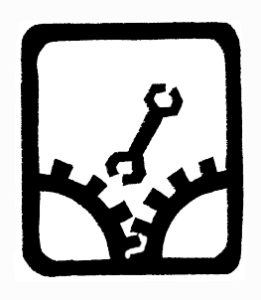
Do you? Do you find yourself pulling yourself back from the brink of success over and over? Is it easier to stay mired in the familiar world of “trying to write” than to take some overdue steps that you know would bring you closer to achieving your dream? Shot yourself in the foot recently?

Yeah. Me, too.
Some experts believe that we self-sabotage when we are actually afraid we might succeed. They suspect that the attention and stimulation that comes with success is somehow linked in the subconscious of vulnerable people with events in their past that were traumatic. Others say it is rooted in our own feelings of worthlessness. If you’ve been emotionally abused, it can be hard to break free of those scars and believe that you actually deserve the life you dream of.
I know a lot of writers who prefer the comfort of the known over the discomfort of the unknown; even when the known circumstances are the state of remaining unpublished, and the unknown is what would happen if they were published and they were able to fulfill their creative dreams.
I think that a lot of writerly procrastination is actually self-sabotage. If you don’t finish your manuscript, or if there are a hundred “good” reasons why it’s not as well-written as you wanted it to be, then you will never have to confront the real pain of rejection, because you’ve already pulled the trigger on a defense mechanism that you hope will protect you.
This makes perfect sense. It also makes me want to bake you brownies and tuck a comfy blanket around you, because that is a painful amount of fear to be carrying. I suspect some writers of books for kids or teens have a further complicating worry; to write the story that is in their heart, they must confront some of the demons of their own youth. Those people deserve an old friendly dog to snuggle with, in addition to the brownies and blanket.
There is a way to write past these fears.
Ready… Put on the most comfortable clothes you own, and prepare the comfort food that soothes all your hurt feelings. Keep it close by while you’re writing. Kleenex might be a good idea, too.
Set… “The demons are innumerable, arrive at the most inappropriate times,
--
So you know I’m training to run in the Marine Corps Marathon in October. I will likely be one of the last finishers, because I am such a slow runner, some people think I am moving backwards. But I’m stubborn as they come, so I will (eventually) make it to the finish line.
You might not know that I also plan to start competing in triathlons by 2015. (When you are as slow as me, you need to plan these things out in advance.) And my long-long term goal involves outliving all of my competitors so I will – at some point in my 90s – win my age group category.
What does any of this have to do with writing, and making the time to write every day?
Transitions.

A triathlon involves three stages: a swim, a bike race, then a run. (Distances of each leg vary, depending on the race and how crazy the participants are.) The photo above shows racers emerging from the water. They strip off their wetsuits in the transition area, then get on their bikes and take off pedaling.

Transition areas are often filled with thousands of racers. (It can be a real zoo.) After the bike leg of the competition, racers have to properly stow their bike on the rack, take off their helmet, change clothes and shoes, and head out on a long run. Racers prepare and train for smooth transitions just as they train for each of the three events.
That same principal comes in handy when you are trying to make daily writing a regular habit. You’re probably pretty good at writing for three or maybe four days in a row, but then life intervenes. The weekend hits. Your in-laws show up. The kids are home on break. Your boss demands you work overtime. The dog gets a stomach flu. Termites eat your walls. The zombie apocalypse begins.
Next thing you know, you’ve fallen out of the habit of writing. AGAIN. And you beat yourself up about it. And you find it even harder to start again, because you know that something else will pop up and derail your carefully laid plans.
Not necessarily, my friends.
All you need to do is to plan for transitions, those short moments in which you have to shift gears quickly and not lose track of your writing goals. And that’s what today’s prompt will help you do.
Ready… Get out your calender and make note of events that are scheduled to occur in the next three months that will likely make it hard for you to squeeze in your daily writing. If shifting gears when the weekend hits regularly creates problems for you, make a note of it. Likewise any upcoming birthdays, or other commitments.
Set… “Other people’s interruptions of your work are relatively insignificant compared with the countless times you interrupt yourself”
Brendan Francis To that I will add, “You have little control over the interruptions to your writing routine. You have total control over how you react to them.”
Today’s Prompt: You are going to develop your transition strategy for surviving the annoying interruptions to your best-laid plans that life conspires to throw at you.
Come up with a list of 15 ideas (Get it? One item for each minute of your writing today – think fast!) that are qu
--
This month, I’ll steer back and forth between discussions of pure craft (like today’s prompt) and discussions of confronting things like writer’s block (see yesterday’s post). I know that you are all in different places in your work, and you have very different needs. We will find a way to tackle your issues, never fear!
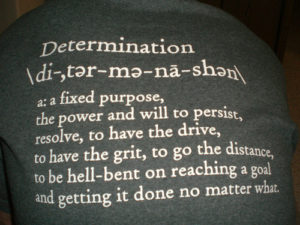
The most important thing is the easiest: write for fifteen minutes today and tomorrow and for about 27 days after that. Many of this year’s participants are teachers, some of whom are already headed back into the classroom. KEEP WRITING!! You only have to do it for fifteen minutes a day until the end of the month. Think of how much you are learning about writing that you can share with your students!
Back to
Think Big, Write Small. ::adjusts glasses::
When writing a novel or novel-length piece of work, you need to keep one eye on the Big Picture; the grand arcs of your story, whilst keeping the other one on the smallest possible details that will allow each scene to carry the strongest impact possible.
This can give you a headache.
I sketched out my notion of the Big Picture on
Tuesday. Today we focus on
WRITING SMALL. Pick up a book that you adore and flip to a memorable scene. I’ll bet you a cheeseburger that the author made very deliberate choices in the details she used. (If you want, go through and highlight some of these choices.) These little decisions; the fabric of a character’s skirt, the memorabilia on a dusty shelf, what she puts on her salad, her choice of taking a taxi or the subway – they all serve a number of purposes. Details given nuance to a story, they help the reader experience the world of the characters, they move the plot forward and they can give insight into a character.
That’s a lot a work for small tidbits of information!
Ready… “As great scientists have said and as all children know, it is above all by the imagination that we achieve perception, and compassion, and hope.”
Ursula LeGuin
Set…Find a place to write where you are guaranteed you will not be interrupted for your fifteen minutes. Lock yourself in the car, hide in the bathroom, put on a disguise, find a new coffee shop, and sit with your back to the rest of the world. By any means necessary, carve out your fifteen minutes and protect them with your life.
Today’s prompt: Choose one of the following.
1. Take a chapter from a favorite book. Identify which details are mission-critical. Rewrite a couple paragraphs and change the details to the point where it impacts the rest of the book. If you have a Work in Progress (WIP), you can do this to one of your own chapters.
2. Write a rough draft of a scene set in a middle-school cafeteria. Have your character go through the lunchline. The kid in front of her is mean and nasty. The kid behind her is much kinder, but is afraid to show it, for fear of bringing the wrath of the bully down on her head. Brainstorm the Write Small details you could use in a scene like this to set the scene, move the plot forward and give us a sense of who the main character is.
Scribble… Scribble… Scribble!
This will be a crazy day for me. (Update: It HAS been a crazy day!) I leave for the SCBWI National conference tomorrow, so today involves laundry, packing, cleaning, more work on speeches and an entire page of various and sundry errands. My short writing break is not listed on my MUST DO!! list. It is on the much shorter “want to do” list. That is a critical distinction.

I was going to finish the “Think Big, Write Small” post today, but a comment from yesterday took me down a detour, because it was so heartfelt and raw. This is what a
WFMAD participant wrote:
“I kind of feel like a poser. I have no characters fighting their ways out of my mind. I have no settings dying to be painted with my words and syntax. There no plot twists, messages, lessons, stories, anything waiting to be brought to life. No poems dancing across the page, or stabbing through the paper/screen with the truth. I have no essays filled with opinions, noticing, wonderings, or truths. I used to have all of these. Where have they gone? And will they ever come back? I am not sure if I can divorce myself from the teacher inside me long enough to stop saying, “That’s a really nice sentence. I should use this in a craft study on…fill in the blank… . That leaves me wondering if my identity as a teacher is eclipsing every other part of me. Has the inspiration for teaching engaging lessons sucked the life out of all other inspiration in my life?”
THAT, my friends, is why we write; to find our truth. Even when the truth is sucky because it contradicts what we want to believe about ourselves. I completely understand what this writer is feeling. I have been stuck there many, many times. (I suspect everyone who writes for a living runs into this.) She is a writer lost in a soul-draining fog. She’s out of balance. The thing that would help her recenter herself is the thing that feels the hardest: writing.
When I’m stuck in this kind of Pit of Despair, journaling helps me build a ladder that I can use when I’m ready to escape. I write about what’s making me feel bad, mad, sad, and scared. I vent big time about the conditions of my life. I can go on for page after page after page (this can take days, weeks, or months) and then, finally, the fog lifts. I find my rhythm, my voice. Inspiration is everywhere. I see interesting conflicts I want to develop and I can hear the characters. I have once again broken through that chainmail veil that separates this reality from the world of pretend. I feel like a writer again. The woman who wrote the question will feel like that very soon, as long as she’s willing to write about her struggle first.
Ready… Take a moment of gratitude. Be thankful that you’ve found the courage to follow your dream, even though it feels scary.
Set… Make sure your pets have done their necessary business outside, and any infants in your house are fed, dry, and comfy. Make sure that you are fed, dry, and comfy, too!
Today’s prompt: Write for fifteen minutes about what gets in the way of your writing. Write a detailed scene about a time you wanted to write, but then [fill in the blank] happened. Why did you let that happen? What could you have done differently? How can you prevent that from happening again?
OR
Write about how you feel when your draft isn’t flowing easily. And what you are able to write is a stinking turd of a story that seems irredeemable. Why are you being so hard on yourself? What do you get
--
Wow! It is so exciting to read all the comments you posted to my blog, Facebook, and Twitter yesterday! I don’t keep hard and fast numbers about this challenge, but it sure seems like we have a record number of participants, with more joining by the hour. How cool is that!!??
So…. how did it go?
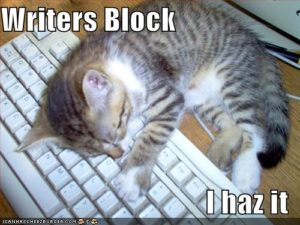
Did the words come fast or slow?
Did the characters whisper to you, or were you writing “from your head,” i.e. thinking things like “I must insert a clever foreshadowing of the B plot into this conversation”?
Did you feel triumphant or afraid? Or, perhaps, a little of both?
Do you have a specific writing question that you’d like an opinion on?
Yesterday I received this question, “I’m at a point where I’m stuck, and I don’t know where to go from here. Any advice?”
I feel your pain!!!
Writing a novel is an absurd idea. You have to create a world, nay, an entire universe, with a past, potential futures, personalities, sometimes a whole new culture, and then you insert the thump of a human heart and breath life into your clay characters and tell them to dance. You try to write down the steps to the dance, and make it flow, and make it interesting, and keep it under a billion words. Oh, and make sure that someone will find it marketable.
What kind of crazy person does that?
We do, my friends. We word-addled tribe of dreamers. That’s the good news and the bad news, because it’s easy to get lost when wandering in imaginary worlds. It is no fun feeling lost.
This is where THINK BIG, WRITE SMALL helps. You’ll use that in today’s prompt.
Ready… Give yourself a gold star (or ice cream) for making it to Day Two!
Set… Take a few minutes to shift gears from the outside world to the inside world. Close your eyes and breathe slowly. You are allowed to take this time for yourself.
Today’s prompt: Write down what you think might be the larger arc or issues or themes of your book. It’s OK if you don’t know for sure. You can change your mind down the road. If you don’t yet have anything as a specific as a theme, then try to summarize, in one or two sentences, the central conflict in your story. It can be the internal character conflict, or the external conflict he is facing in the world. (Or both!) This is your BIG PICTURE. It is the heading on your compass.
When you get stuck, reread your Big Picture statement(s). Say it aloud, write it in the sand, translate it into Bulgarian (or your language of choice), and then ponder:
1. What scenes can you invent that reflect the conflict of the Big Picture? Make a quick list of five such scenes.
2. Do you need to introduce new characters to complicate the Big Picture? Quickly write a few lines about five possible characters.
3. Your main character could likely use another layer or two of nuance. Which is a polite way of saying he needs some flaws. In one of your new scenes, or in conversation with one of the new characters, have your main character behave badly. Allow him to be a jerk, or make a foolish decision, or make a mistake.
Part Two comes tomorrow!
Scribble…Scribble…Scribble!
--
It’s August! That means the Fourth Annual Write Fifteen Minutes A Day© Challenge is here!
Get ready to scribble!
The rules are simple. In fact, they aren’t even rules. They’re more like guidelines, the Pirate Code of Writing.
1. Commit to write for 15 minutes a day for the entire month of August.
2. Just do it.

Seriously. That’s all there is to it. You don’t have to sign up anywhere, or meet minimum word count goals or complete a whole freaking novel in 30 days. You can write fiction, non-fiction, memoir, or poetry. Personally, I don’t think blog writing should count because that is immediately published and you always have your audience in mind. I think this month should be a chance for you to go deeper inside yourself. But if blog writing makes you happy, go for it.
Just. Write. Every Day. This Month.
15 Minutes.
This is not the time for editing or outlining. Just keep your pen, pencil, crayon, or fingers on the keyboard moving for 15 minutes. You can use the entire time to write “I don’t know what to write and LHA is crazy” the whole time if you want.
I’ll give a prompt a day for anyone who is feeling stuck. But you don’t have to use it if you don’t want to.
I would love it if you guys checked in with me by posting in the comments section. Tell me where you wrote today or for how long, or what you were working on. Tell me what kind of resistance thoughts cropped up as you were writing, or trying to start writing. Tell me what it felt like when the 15 minutes were up.
I will be doing the same thing. I’ve been juggling several books in my head this year; it has not been pretty. And we’ve been renovating our house. I will try very hard not to whine about that. (BUT IT IS TEMPTING!) And it’s August, so it’s hot. And I leave for the SCBWI national conference in a couple days. And…
And…
And…
You see, it’s always something. ALWAYS. There are always things that will get in the way of your writing. Writing can be uncomfortable and awkward. That’s why we procrastinate about it. That’s why we often choose to put writing as our last priority instead of in the top five. We like thinking about writing, and talking about writing, and blogging about writing, but when it comes to the actual writing? Too often, we allow life to get in the way.
Right?
I’ll cut some slack for certain groups of people. If you have a new baby in your home, if you’re recovering from major surgery, if someone you love has recently died, you have all my compassion and permission not to worry about writing until your life settles a bit.
But the rest of you?
You can easily carve out fifteen minutes every day to write. You could probably find more time, but I think baby steps are more fun and effective then setting massive, unobtainable, sure-to-backfire goals. This challenge (known as WFMAD for obvious reasons) is about support, not scolding. I like to focus on how we can pick ourselves up off the ground, instead of focusing on the fall.
I can’t promise you a book contract, but I will promise you this: writing every day will help you find yourself again. Writing every day will restore creativity to your life. Writing every day will help you discover balance and bring in more opportunities for happiness. Honest!OK, that’s enough blathering.
Ready….
Disconnect from the Internet (as soon as you finish reading this post!)
Set…
Turn off
--
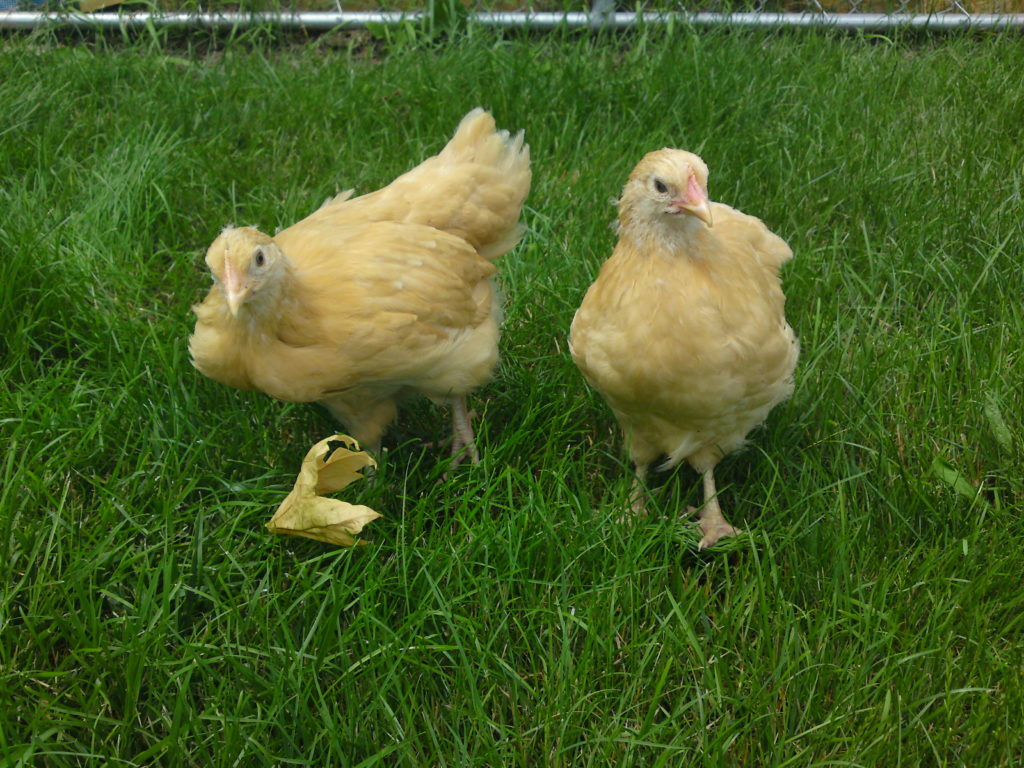
More questions today, with the added bonus of answers!!
::shoos chickens out of way::
Not sure if you can answer this, but how do the covers of books get chosen?
It’s kind of a mystery to me, too. Publishers have departments of people who are artists. They have other departments filled with sales and marketing people. Near as I can figure, when it’s time to design a cover, the members of the three departments gather in a secret location and hold a massive game of Rock, Paper, Scissors to determine which dept. gets to take the lead on the design. The other two depts. have input, but too a limited degree.
I don’t know how much input other authors have on their covers. I seem to have none. I like most of the covers of my books and love a couple of them. Whenever I have tried to make suggestions about cover art, I’ve been gently reminded that I am an author, not an artist or a member of the sales and marketing departments. So my approach is to focus on what I can control – my writing – and leave the other stuff to the people who know more about it than I do.
1st person verses 3rd person ~ or do you feel it matters?
How do you know which character’s person if first person?
The point of view (POV) from which you tell your story is hugely important. But sometimes you might not be able to figure which POV to use. Or, in the case of 1st person POV, which character is your POV character.
This might help: Do a quick and dirty draft in the third-person POV – from the first page to the last. By the end of the draft you’ll know who the most important person is in the story. Experiment with writing a few chapters from that person’s POV. If it feels natural, then run with it – turn your first revision draft into an exercise of shifting the narrative from 3rd to 1st POV.
I wrote the first eight drafts of FEVER 1793 in 3rd person. Then I shifted to 1st person, did another five revisions and finally wound up with a book that someone wanted to publish.
Yes, it seems like a lot of work. But sometimes it’s what you have to do.
How do I weed out the “fluff”, to see the forest for the trees, so to speak, no matter how awesome the fluff may be?
How do you know when a story is worth the time of others for a critique?
How do you maintain confidence when success rate is like 0.1%????
These questions are all connected. And I will answer them all… on Tuesday.
Ready…. “Ideas are the cheapest part of the writing. They are free. The hard part is what you do with ideas you’ve gathered.” Jane Yolen
Set…. three days left in WFMAD – you can do this!!
Today’s prompt:
1. Write out the steps you need to take in order to finish your current work in progress. Be as detailed and precise as possible.
2. Give yourself deadlines.
3. Now double the deadlines and write the dates down on a calender. Do you have a writing buddy you can share this with? Someone who will hold you accountable to your deadlines?
4. Write out your vision of the most perfect things that could happen to your story and to you after you submit it for publication. Be detailed and precise about this, too. And have fun with it!
Scribble…Scribble…Scribble!!!
--
Bookavore, bookseller extraordinaire at WORD in Brooklyn (and my oldest kid) has weighed in with a resolution to remedy the mud-slinging that seems to be heating up between adult “literary fiction” authors and adult “genre fiction” authors. (You haven’t heard about the feud? Details here.) If you, too, were a Model UN nerd in high school, this will completely make your day. Even if you weren’t a Model UN nerd, this will make you smile.
Ready… “Too often, as we leave the tribal culture of childhood – and its sometimes subversive tales and rhymes – behind, we lose contact with the instinctive joy in self-expression; with the creative imagination, spontaneous emotion, and the ability to see the world as full of wonders.” Alison Lurie Don’t Tell the Grown-Ups: Why Kids Love the Books They Do
Set… before you tell the world to go away so you can write, make sure you have blocked out writing time tomorrow and on Sunday.
Today’s prompt:
1. Go for a walk. Bring something to write with and on whilst walking. (Bonus points if you can walk in a park where kids are playing.)
2. Write down five things of nature you see on your walk. F. ex: brook, dead salamander, clouds.
3. Write one sentence about each item from your POV (point of view).
4. Choose the face of a child from this website.
5. Write one sentence about each of your items from that child’s POV. Then choose the item that is most intriguing to that child and write as much as you can about how it came to be there, about what its purpose is, or about what is going to happen next to that thing. Don’t judge your work, don’t impose your adult vision on the words. Be more chill and let them tumble out.
Scribble… Scribble…Scribble!!!
--
Two quick reviews for you: Reading Rants weighs in on FORGE and WINTERGIRLS reviewed in Colorado.
How did your writing go yesterday? Mine floooowed. Like creekwater after a thunderstorm. Sugar pouring from a blue china bowl. Like round hips swaying under a loose skirt to a hot salsa trumpet.
Seriously. It was that good. It was hard to come back to the real world and do things like eat. Run. Brush teeth.
As the sun started to set, the Muse returned. Much to the dismay of my chickens, she arrived in the shape…
 ….of a large, hungry-looking
….of a large, hungry-looking
HAWK!

She watched the very well-protected henhouse for a while

then took to the air

and flowed

back into the Forest.
It was breathtaking. Especially for the chickens, who, I am happy to report, escaped disaster. For the moment.
Ready… “O for a Muse of fire, that would ascend
The brightest heaven of invention,” Henry V, William Shakespeare
Set… make sure any rodents or poultry you care about is under roof. Then turn off the damn phone.
Today’s prompt: Make a list of ten animals that could be your Muse. Circle the one that evokes the strongest reaction in you; positive or negative.
Write a scene in which you or a character has an interaction with this animal. At some point in the scene, the animal does something to change your emotional reaction to it. Either you first find it cute, and then disgusting. Or at first frightening, and then enchanting.
After the emotional switch, you get to ask the animal three questions. What will you ask? And what are the answers?
Scribble… Scribble… Scribble!!!
View Next 25 Posts






























